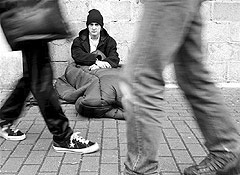
| HOME |
| NERVE |
| REVIEWS |
| ARCHIVE |
| EVENTS |
| LINKS |
| ABOUT US |
| CONTRIBUTORS |
| BACK ISSUES |
| CONTACT US |
 Poverty
Of Ideas: How Inequality Has Increased Under New Labour
Poverty
Of Ideas: How Inequality Has Increased Under New Labour
By Adam Ford
Before the general election, Tony Blair and Gordon Brown were at pains to show they were the best of friends, and not actually rivals for the top job after all. The two cooed over each other in soft focus, while Blair described Brown as "our best chancellor for this country for several decades." Many in the business community agreed, which is why the Labour Party received millions of pounds from their rich backers in the first few months of the year, and the print media largely fell in line behind their re-election campaign. But there was one fact curiously missing from much of the debate on Labour's record: levels of poverty remain more or less unchanged since Blair and Brown came to power in 1997.
That's something that is of particular interest in this city, because Liverpool has four of the ten poorest postcode areas in the country. Of course, all debates on poverty hinge on how you measure poverty. Although many pressure groups and charities argue for a higher threshold, the government's preferred method is to describe all those on less than half the median (or average) income as being in poverty. On this measurement, there has been a small decrease in the number of children and pensioners living in poverty under Labour. According to a March report by the Institute For Fiscal Studies, 22.9% of children lived in poverty in 1997, compared with 19% in 2004. Pensioner poverty levels saw a similar fall - from 12.5% in 1997 to 9.8% last year.
While this might sound like a step in the right direction, there are several problems with this analysis. For a start, these are supposed to have been golden years for the economy, with record low levels of unemployment. If poverty levels have fallen by only a couple of percentage points, what is going to happen when - as seems likely - the economy takes a turn for the worse?
Secondly, the government has made some relatively big changes, such as the minimum wage, working families tax credits and pension credits. If the combined impact of these changes is only to push poverty down by this small amount, what else can the government be planning to bring it down further? As it happens, a quick look at their 2005 manifesto shows that Labour has no big new plans in this respect. So much for that.
Third - and perhaps most importantly - a large number of people have actually been pushed into poverty by the working families tax credits. Business has been able to offer lower wages to new employees, because they know that the state will pick up the difference. If you have no dependent children, and work less than 30 hours, then you are not covered by the new credits, so your real income may have actually gone down. With people now unlikely to stay in the same job for any length of time, more and more people are finding themselves taking home less than they did just a few years ago, for the same kind of work.
Another survey group - the Joseph Rowntree Foundation - has had strong links with the Labour Party for many years. But their recent report was also damning about the extent of poverty in the UK. They found millions are unable to afford necessities such as decent food and clothing, because the poorest 10% has seen their income increase by less than the cost of living.
Even more staggeringly, homelessness has doubled under New Labour. According to the government's own figures, the number of families without a permanent home has now reached 100,000. With social housing gradually being privatised, and the average home now costing eight years salary for the average worker, many are being forced into temporary accommodation or sleeping on the streets.
In terms of pure inequality, another report showed that the richest 1% of the UK population owned 20% of all the country's wealth in 1996. By 2004 this had risen to 23%. This shows that the money paid out in wages and benefits is a smaller proportion of the wealth created by employees than when Blair and Brown reached Downing Street.
If you take all these figures together, it becomes clear that New Labour has merely taken wealth from one section of the poor and given it to other sections, whilst allowing the wealthiest to get even wealthier. These things do not happen by accident, they are planned many years ahead by different government departments. They come as a result of pressure from big corporations and media groups such as Rupert Murdoch's News International - who try to distract people by publishing scaremongering attacks on other vulnerable people. They come because of policies promoted by organisations such as the G8, World Bank, and International Monetary Fund. They come because governments are increasingly forced into competition with each other to offer the best conditions for investment. Within each country, the pro-business 'mainstream' parties fall over themselves to undercut the others and propose the best deal for the rich. These trends will all continue until people decide that politics is something more than choosing between the evil of three lessers every few years.
Printer friendly page